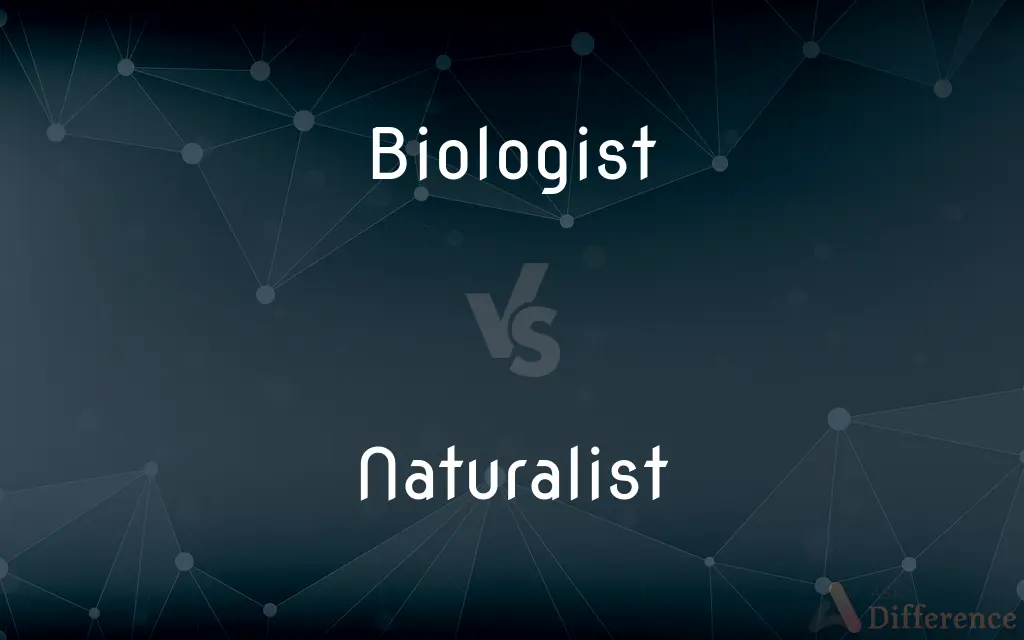Biologist vs. Naturalist — What's the Difference?
By Urooj Arif & Maham Liaqat — Updated on April 26, 2024
A biologist systematically studies life and organisms, focusing on cellular and molecular mechanisms; a naturalist primarily observes and documents natural phenomena, emphasizing fieldwork.

Difference Between Biologist and Naturalist
Table of Contents
ADVERTISEMENT
Key Differences
Biologists engage in rigorous scientific research, often using controlled experiments to explore the fundamental processes of life. On the other hand, naturalists tend to focus more on observing natural habitats and organisms in their native environments, contributing to ecological and environmental understanding.
The work of a biologist often requires a formal education in biology or related sciences, typically involving degrees at the undergraduate and graduate levels. Whereas naturalists may come from various educational backgrounds, relying more on experience and personal interest in nature rather than formal scientific training.
Biologists are likely to specialize in specific fields such as microbiology, genetics, or zoology, which allows them to develop a deep understanding of particular life forms or biological processes. In contrast, naturalists often have broader interests across different natural phenomena, including plants, animals, and ecosystems.
The outputs of a biologist's work frequently contribute to scientific papers, pharmaceuticals, or biotechnological applications, aiming to advance medical or scientific knowledge. On the other hand, naturalists often produce guides, blogs, or participate in conservation efforts, focusing on education and preservation.
While biologists typically work in laboratories, universities, or with industry, naturalists are more commonly found in parks, nature reserves, or in the field, interacting directly with the environment and the general public.
ADVERTISEMENT
Comparison Chart
Education
Requires formal scientific education
May not require formal education
Focus
Cellular and molecular mechanisms
Observational studies of ecosystems
Specialization
Often in specific fields like genetics
Broad interests, including flora and fauna
Work Output
Scientific papers, medical applications
Guides, blogs, conservation efforts
Primary Workplace
Laboratories, universities
Parks, nature reserves
Compare with Definitions
Biologist
Often conducts experiments to test hypotheses.
The biologist set up a controlled environment to observe cell behavior.
Naturalist
Often involved in environmental education and advocacy.
The naturalist led a workshop on local wildlife conservation.
Biologist
Frequently collaborates with other scientists on research.
The biologist collaborated with a chemist to study enzyme reactions.
Naturalist
Observes and studies nature, often through fieldwork.
The naturalist recorded bird calls to identify species.
Biologist
Uses advanced technologies for research, like CRISPR.
The biologist uses CRISPR technology for gene editing in mice.
Naturalist
Produces detailed descriptions of observations.
She documented the seasonal behaviors of foxes in her journal.
Biologist
Studies life at various levels from molecular to ecological.
A biologist might study the effect of a virus on human cells.
Naturalist
May contribute to citizen science projects.
The naturalist participates in annual butterfly counts for a national survey.
Biologist
May specialize in fields like botany or marine biology.
As a marine biologist, she focuses on coral reef ecosystems.
Naturalist
Focuses on the interrelationships within ecosystems.
He studies how invasive species disrupt local habitats.
Biologist
A biologist is a scientist who conducts research in biology. Biologists are interested in studying life on Earth, whether it is an individual cell, a multicellular organism, or a community of interacting populations.
Naturalist
One versed in natural history, especially in zoology or botany.
Biologist
The science of life and of living organisms, including their structure, function, growth, origin, evolution, and distribution and encompassing numerous fields such as botany, zoology, mycology, and microbiology.
Naturalist
One who believes in and follows the tenets of naturalism.
Biologist
The life processes or characteristic phenomena of a group or category of living organisms
The biology of fungi.
Naturalist
A natural philosopher; a scientist.
Biologist
The living organisms present in a specific area or region.
Naturalist
(philosophy) A person who believes in or advocates the tenets of philosophical or methodological naturalism.
Biologist
A student of biology; one versed in the science of biology.
Naturalist
An expert in natural history or the study of plants and animals.
Biologist
A student of biology; one versed in the science of biology.
Naturalist
(art) A creative artist who attempts to faithfully represent nature; an adherent of artistic naturalism.
Biologist
(biology) a scientist who studies living organisms
Naturalist
One versed in natural science; a student of natural history, esp. of the natural history of plants or animals; a botanist or zoologist.
Naturalist
One who holds or maintains the doctrine of naturalism in religion.
Naturalist
An advocate of the doctrine that the world can be understood in scientific terms
Naturalist
A biologist knowledgeable about natural history (especially botany and zoology)
Common Curiosities
What tools do biologists use?
Biologists use a variety of tools from microscopes to DNA sequencers.
What education is needed to become a biologist?
Typically, a degree in biology or a related field is required.
Do biologists work alone or in teams?
Biologists frequently collaborate with other scientists and professionals in related fields.
How do naturalists contribute to conservation?
They often participate in or lead conservation projects and educational programs.
What is a common workplace for a naturalist?
Naturalists often work in nature reserves, parks, or in the field.
How do biologists impact healthcare?
They contribute to medical research, drug development, and understanding diseases.
Are biologists and naturalists focused on the same goals?
Both aim to understand and explain natural processes, but their methods and applications differ.
Can a naturalist conduct scientific research?
Yes, but it's often observational and less controlled than traditional scientific research.
Can naturalists be considered scientists?
Yes, although their approach is more observational and holistic compared to the experimental methods often used by scientists.
What is the importance of a biologist’s specialization?
Specialization allows biologists to develop expertise and contribute significantly to specific areas of scientific research.
Share Your Discovery

Previous Comparison
Nil vs. Zero
Next Comparison
Refamiliarise vs. FamiliariseAuthor Spotlight
Written by
Urooj ArifUrooj is a skilled content writer at Ask Difference, known for her exceptional ability to simplify complex topics into engaging and informative content. With a passion for research and a flair for clear, concise writing, she consistently delivers articles that resonate with our diverse audience.
Co-written by
Maham Liaqat















































